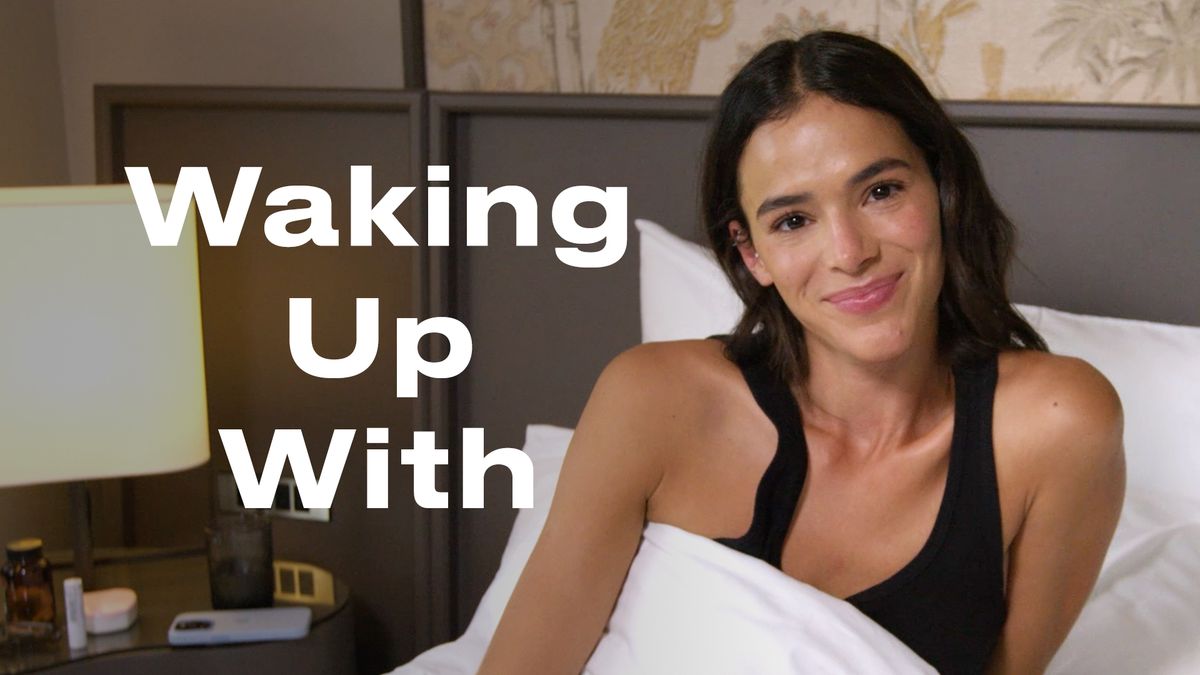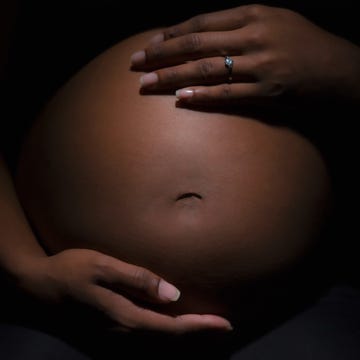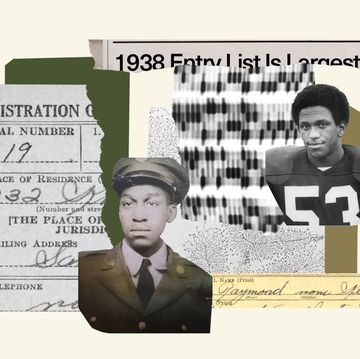Are they one of your success stories?" I asked, pointing behind Dr. H. to a large silver-framed photo of two fat-cheeked babies, identical twins. Dr. H. was my fertility doctor, and this was our first appointment.
"They're my grandkids," he explained, then laughed. "But everyone always says the same thing"—he held up his hands, like someone appealing to a higher power, and shook them dramatically—"'We don't want twins!'"
Hilarious, I thought. Dr. H.'s reaction suggested that anyone desperate enough to visit him would take a kid any way she could get one.
"But I really don't want twins," I said. "I already have a three-year-old, and money is tight. One more is all we can handle."
"Welllll," Dr. H. replied, "given your age, we need to be aggressive. So I'd recommend going right to IVF. But if you want, we can transfer only one embryo."
For that privilege, I had my insurer to thank, surprisingly enough: Since my policy covered three rounds of IVF, Dr. H. said, we could be conservative with the number of embryos we implanted each time.
"Great," I replied, with a sigh of relief. "Then let's get started."
I left the consultation feeling excited and optimistic. Here was a science so precise that Dr. H. could choose among outcomes—you don't want twins? Fine. I'll just implant one embryo. I was in control, finally. I'd spent months taking my temperature, monitoring my cervical mucus, and visiting an acupuncturist, wondering all the while if these efforts were any more effective than chanting a spell: Bibbity, bobbity, boo!
One thing I'd somehow forgotten to ask Dr. H. about was my chance of becoming pregnant using a single embryo. According to research I'd done before seeing him, I knew that the live birth rate for in vitro fertilization for a 43-year-old like me was less than one in 20, and that was when the average number of embryos implanted was three. So going with only one had to worsen the already poor odds, didn't it? But I kept silent. Not only did I manage not to know what I knew, but I even imagined that I had an advantage over the other women sitting in Dr. H.'s waiting room reading outdated copies of Fit Pregnancy and Parenting (selections that struck me as insensitive as offering Gourmet to bulimics). I'd already proven I could get pregnant; not only that, my husband and I conceived our three-year-old son immediately after I stopped using birth control. And we seemed to have luck on our side: The crappy health plan supplied by my husband's nonprofit employer paid for three IVF cycles. As I said to him after meeting with Dr. H., what did we have to lose?
Within three months, however, I'd abandoned the one-embryo idea almost as if I'd never heard of it. A few friends my age had implanted as many as five embryos at once, with no baby to show for it. I was crazy, not to mention arrogant, they said, to think I could get pregnant with one. I also found out that the fine print on our crappy insurance policy said that to be eligible for IVF, you first had to try the more basic intrauterine insemination (in which my husband's sperm would be injected into my uterus during a hormone-enhanced ovulation). By the time I was able to have an embryo implanted, who knew how much older, and less likely to conceive, I'd be?
So following our insurer's rules, I did the turkey-baster routine, and after 12 days headed back to Dr. H.'s office for a pregnancy test. I'd already gotten a negative result at home, and I just wanted to move onto the high-tech stuff. "It's bad news, isn't it?" I greeted Dr. H. when he called later that day.
"Actually, no," he said. "You're pregnant. In fact, your levels are quite high." He paused. "And I'm afraid it might be twins." He sounded apologetic; maybe he'd registered my objections after all.
I reminded him that when we did the insemination, he'd said that although I'd produced four follicles—as opposed to the one generated naturally—it was "highly unlikely" that more than one of the eggs would be fertilized. (Later, I'd realize that the ovulation-induction drug Dr. H. suggested I take, Gonal-f, comes with a higher chance of multiples than the more common Clomid. He'd breathed not a word of this to me.)
"We won't know anything for sure until we do a sonogram," Dr. H. tried to reassure me. "And a third of the time, one of the twins vanishes anyway. So it's too early to tell. But you're pregnant—that's the important thing.... Congratulations." It came out sounding like an admonition. Or perhaps he was opposed to abortion and trying to steer me away from the procedure known as "selective reduction," in which one or more fetuses in a multiple pregnancy is terminated. I had no way of knowing.
Hanging up the phone, I waited for a wave of feeling to break over me. When I'd learned that I was pregnant with my son, I couldn't stop smiling for days. Walking down the street, sitting across the table from a friend, my face was involuntarily lit. But now I felt panicked, unprepared, and doubtful about my ability to handle what fate had thrown at me.
It happened to be my husband's and my anniversary. We'd been together long enough that we didn't feel obliged to mark the occasion with flowers or candlelit dinners, but as he walked in the door that night, the timing suddenly seemed serendipitous. "Happy anniversary!" I said, pressing my lips to his. "I'm sorry I didn't get you anything. Oh, there is this one little thing...." I stared coyly up into his face.
He lifted his eyebrows. "You're pregnant?"
I nodded, but already my choice of words, "one little thing," rang ominously in my ears. I trapped my bottom lip between my teeth. "Apparently my levels are high. He thinks it might be twins."
My husband pulled back from me with the abruptness of someone who's just learned he's been betrayed. "Bettina, we can't handle twins," he said firmly.
"Well, we could if we had to. People have a toddler and twins all the time."
"I told you when you started all this that I didn't want twins."
I nodded. He had said that. Unlike me, he'd been reluctant to have a second child. Our son was everything we could've wished for—funny, smart, a source of regular joy. As he got older, our lives got easier. We took trips and found time for exercise and going to movies; we even had space in our two-bedroom apartment for guests. But at that moment, I didn't want to hear any of that. I'd always wanted two children, and I countered with my best argument: Preserving our lifestyle seemed like a self-centered reason to deprive our son of a sibling.
Selective reduction had been my contingency plan, yet I'd never thought—or felt—through actually using it. I didn't even know how the procedure was done. Now I was horrified at the idea of terminating one of the fetuses growing inside me by injecting potassium chloride into his or her heart.
With my son, I'd witnessed the step-by-step progress from blip to eight-pound, two-ounce boy, marveling at the increasingly recognizable sonogram images, poring over the weekly e-mail announcements from a pregnancy website: Your baby now has fingernails, your baby is now the size of a lemon, a banana, a melon. ... And while I strongly believed in women's right to have an abortion, the unlucky fetus destined for elimination wasn't merely an abstract potential life, or an accident. He or she was the product of my love for my husband, a life we'd made together on purpose. This fetus had an identity, not least as someone's twin. "Selective reduction" was Orwellian; I knew I was ending what could be a life.
I also worried that the surviving child would be scarred by the loss. Perhaps the fetus would register the cessation of the heartbeat in the neighboring sac, the stilling of the fluttery movements. Could the proximity of decaying fetal tissue infuse my womb with the specter of death? If the chosen one ended up with mental illness or autism, would I always blame myself for having a reduction? All this may seem melodramatic, but I've heard about identical twins holding hands in utero; I've seen the secret language and private reality shared between even fraternal twins.
This kept me awake at night, inflected my dreams with shadowy predators. Meanwhile, I learned that the optimal time to reduce was between 11 and 13 weeks—and a chorionic villus sampling (CVS) was recommended beforehand to ensure that the fetus retained had the best chance of being healthy. I had to make these appointments while deciding what to do. On the Web, I found a small, controversial message board on which veterans of reductions offered guidance. I searched among the threads for a local doctor willing to perform a two-to-one reduction—many won't—feeling as if I were searching for a back-alley abortion.
"But neither of us even likes our brothers and sisters that much," my husband persisted. In fact, if it weren't for the affection between our son and his cousins, he went on, we'd rarely see our siblings. Eventually, though, it was the sweetness of the cousins' connection that persuaded my husband to agree to a second. Then, when he had one foot onboard, I dragged the rest of him into the world of assisted reproduction—about which he knew just enough to issue the dictum against twins. Don't worry about it, I'd bluffly assured him. If we end up with more than one, there's a way to take care of it. But I was certain that wasn't going to happen.
During my weekly visits to Dr. H.'s office over the next month, I watched the two little sacs on the sonogram darken and grow, develop heartbeats and vaguely human outlines. "Can you turn the screen away, please?" I asked, tears pooling in the corners of my eyes. "I don't want to get attached."
Dr. H. turned it toward me and said sternly: "Start getting attached."
I'd already asked him about selective reduction. A colleague of his had told me that many women do it, and that it was no more dangerous than amniocentesis. But Dr. H. contradicted her: The odds of losing the entire pregnancy were about 10 percent, he said, and he didn't do reductions himself.
I kept telling myself I should be happy to be pregnant at all: After wanting another child for the better part of two years and trying and failing for 12 months to have one on my own, I'd conceived! But I grew increasingly despondent as the deadline for terminating one of the pregnancies loomed. My husband was convinced that twins would radically change our lives for the worse. We'd have to leave our beloved neighborhood for a place with cheaper rents and better public schools—there was no way we could afford private education for three kids. We'd kiss goodbye any hope of career advancement, at least for the foreseeable future. To his list, I added the loss of my income, necessary to meet our expenses. I couldn't see how I'd be able to resume working after the birth since we could never afford full-time help, and—no matter how well they napped—two infants wouldn't leave much time for anything else.
But, but, but...Wasn't sacrifice part of what being a parent was all about? Was it more accurate to say that we didn't want to handle twins, rather than we couldn't? Perhaps the answer to that question would've been yes, had my husband and I been two totally different people. Because beyond the practical concerns, I knew that we didn't have the energy, the patience, or the fortitude to juggle two infants in addition to our son. As it was, I sometimes felt like a superhero, and my husband and I fought over sharing the responsibilities of one child. Even in the best of times we struggled not to bark out demands and to keep from seeing the other as the enemy. But struggle we did, because the life we'd made—our marriage, our community of friends, and especially our son—seemed worth the effort. I seriously doubted that this fragile equilibrium could withstand the stress of three young children. And as much as I wished the situation were different, it wasn't. I know it sounds selfish, but I wanted to protect the well-being of the people already in my life—my son, my husband, and, yes, myself.
Every sign of the new lives growing inside of me—my tightening waistband, my tender breasts, my queasiness—felt like punishment for my baby lust and an indictment of my failings as a mother. Since I was certain I couldn't manage two babies, how could I be sure I wouldn't be overwhelmed by one? I entertained dark daydreams of miscarrying both children as a way out of this intractable situation. I was furious at myself for closing my eyes to the risks of multiples—I felt as irresponsible as someone who kept getting "accidentally" pregnant because she forgot to insert her diaphragm.
When a woman is carrying three or more fetuses, the medical argument in favor of selective reduction is clear. A 1999 study compared the outcomes of 143 cases of triplets reduced to twins to 12 sets of triplets and 812 sets of twins. A quarter of the women carrying triplets lost the entire pregnancy, versus 6.2 percent of those who reduced triplets to twins, which was in line with the miscarriage rates for the nonreduced twins. Further, a quarter of the triplets were severely premature (and all had attendant complications), compared with 5 percent of the triplets reduced to twins. Beyond the improved medical outcomes, the daunting financial, emotional, and practical challenges of raising triplets—and the potential psychic toll of being one of three (from the developmental delays connected to prematurity to a deficit of parental attention at a young age)—makes reducing triplets pretty uncontroversial.
Not so twins. Plenty of people have twins and manage to care for them. And there has been no real medical rationale for going from two to one, although recently that has changed somewhat. The risks of selective reduction have declined since it was pioneered by New York obstetrician Mark Evans 26 years ago, when the odds of losing the entire pregnancy were roughly 10 percent (as Dr. H. told me). But now the figure for two-to-one reductions is roughly 3 percent, according to Evans.
Studies have shown that after a reduction, pregnancies tend to proceed as if a woman had begun with whatever number of fetuses she ends up with. So given the roughly 8 percent chance of miscarrying twins, compared with 4 percent for a single baby, a woman who has a reduction cuts in half her odds of losing her pregnancy. Moreover, national health data shows that twins are more than five times as likely to be born premature before 37 weeks, seven times more likely to be born prior to 32 weeks, and nine times more likely to have a low birth weight. In a paper examining these risks in the journal Obstetrics & Gynecology, Evans and his coauthors concluded: "Our data suggest that the likelihood of taking home a baby is higher after reduction than remaining with twins."
But the medical benefits didn't drive our decision—which was true among posters on the selective reduction message board: Even if they said they hoped to maximize their chances of "taking home a baby," they didn't think friends and family would buy it. "Don't tell anyone," they advised. "If you already mentioned that you were pregnant with twins, say that the other one vanished." I'd told a few friends that my hormone levels might indicate two fetuses, but now I lied, saying my doctor had been mistaken.
"Thank God," my sister-in-law exclaimed. She told me about a single friend who got pregnant with artificial insemination and was considering aborting one of the fetuses. "Can you imagine? It's like there will always be this secret from the remaining one."
"Well, can you blame her?" I snapped. "It'd be hard enough to have one on your own, but two?" What I wanted to add but didn't was that despite working part-time and having a full-time nanny and a relatively helpful husband, my sister-in-law complained incessantly about how exhausted she was caring for two kids, two kids who were three years apart. I was taken aback by the ferocity of her judgment—particularly since I'd heard her argue just as fervently for a woman's right to choose. But I'd begun to realize that people viewed selective reduction in its own category: You weren't terminating an unwanted accidental pregnancy; you were making a "Sophie's Choice" between siblings, something a good mother would do only with a gun to her head.
My husband told me he'd support whatever choice I made, but for him, there really was no choice. Our twins weren't part of God's plan, he reasoned (or rationalized?). They were the product of artificial insemination. If we'd become pregnant with twins naturally, would we be making the same decision? I didn't know. All I knew was that ultimately, I didn't think we could have twins and remain an intact, happy-enough family. Perversely, I held out hope that the CVS would show that one of the fetuses had an abnormality. But when the genetic counselor called with the results, she informed me, in the chipper voice of a weatherwoman reporting sunny skies, that both my babies were healthy.
My mother came into town to watch our son while my husband and I traveled to a neighboring state for the reduction. She was one of the few people I'd confided in. Initially, she'd offered to help take care of the twins if we kept them. "Maybe you could move closer, or I could move there...." And then the conversation trailed off, as we both realized the unlikelihood of either option. Just as my husband and I weren't the types who could easily roll with however many babies came our way, my mother wasn't the type to uproot her existence to care for her grown daughter's children. (I couldn't imagine accepting my mother's offer, anyway. For better or worse, people in my family take care of themselves.) Now, as my husband and I headed out the door, my mother briefly hugged me and assured me that we were doing the right thing, which unleashed the tears I'd been fighting back all morning. "Bye, sweetie!" I called over my shoulder to my son in a wobbly voice.
"Bye, Mommy," he replied, happily building a block tower with Grandma.
My husband and I passed the hour-and-a-half car ride mostly in silence. Every once in a while, he'd reach over and squeeze my hand. "It's going to be okay," he said a few times.
After another stretch of silence, I asked, "Could you say a prayer when they're doing it?"
He glanced at me, looking slightly surprised. "Sure. Of course." Neither of us is very religious, but I wanted God to know that he or she, or whatever form God took, hadn't been forgotten.
There was a long wait. I worked on a complicated cable-knit sweater I was making for our son, happy my hands and brain were engaged. After the first hour, my husband said he wished he had some knitting too. Occasionally, I'd scan the faces of the other women in the crowded waiting room. Though the coffee tables here were also piled with copies of Fit Pregnancy and Parenting, hardly anyone was looking at them. Instead, they watched a TV tuned to a talk show or chatted quietly with a companion.
"Bettina Paige?" called a nurse.
Clutching the knitting needles, my hands froze. I could just not answer, I thought. We could get back in the car and drive home. We could keep both babies and make it work, just like we'd absorb and face all the other challenges that were bound to arise: the death of our parents, financial struggles, our own mortality. Instead, I took a deep breath and reached for my husband's hand. "Here," I said.
Our doctor told us that she'd take into account any gender preference if the CVS determined that both babies were equally healthy. Now as she examined the ultrasound, she asked whether gender mattered to us. "Well, we have a boy at home, so I guess we'd prefer a girl," I said, realizing with a start that since she gave us a choice, I must be carrying a boy and a girl, and I'd just chosen to terminate a boy. I had a vision of what our son's brother might have looked like—the same dimples, slender back, and full lips. I felt a rush of nausea, as if I was eliminating a bit of him, too—or at least his DNA.
What I couldn't foresee, lying there on the table, was how guilty I'd feel watching my son struggle with having to share his mother with only one sibling: the girl I'd give birth to seven months later. Nor could I anticipate the number of times that I'd think to myself—as I stumbled out of bed to breast-feed in the middle of the night, or yelled "No!" to my son as he threw a ball too close to the baby, or harangued my husband with the tally of how many diapers each of us had changed—thank God we didn't have twins. We'd made the right decision, for us.
The doctor spoke quietly to the ultrasound technician, instructing her to shift the wand this way and that. "I'm inserting the needle now," she said. "You'll feel a pinch." My husband moved to the head of the bed, just as he had during our son's birth. I stared up at him as he closed his eyes and his lips started to move in silent prayer.













